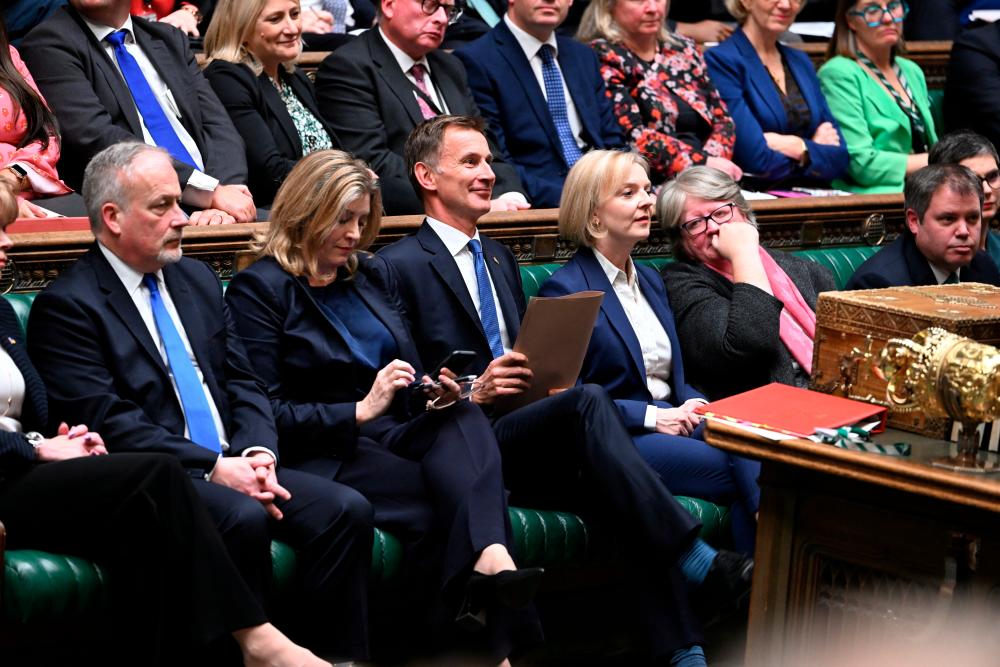LONDON: Britain’s Prime Minister Liz Truss (pic) apologised for “mistakes” in her programme that caused investor confidence to evaporate and her poll ratings to plunge before nearly all of it was finally shredded on Monday (Oct 17), but said she would not step down.
“I do want to accept responsibility and say sorry for the mistakes that have been made,” Truss told the BBC.
“I wanted to act but to help people with their energy bills to deal with the issue of high taxes, but we went too far and too fast.”
Chancellor of the Exchequer (finance minister) Jeremy Hunt, who was appointed on Friday after Truss sacked her close ally Kwasi Kwarteng, jettisoned the remaining major planks of her tax-cutting agenda on Monday, including scaling back her vast energy support scheme.
Asked if she was now prime minister in name only, Truss said she had appointed Hunt because she knew she had to change direction.
“It would have been completely irresponsible for me not to act in the national interest in the way where I have,” she said. “It was right that we changed policy.”
Truss and Kwarteng attempted to upend British fiscal policy by unveiling £45 billion (RM239 billion) of unfunded tax cuts last month to snap the economy out of stagnation.
But the response from bond investors was brutal and borrowing costs surged. Lenders pulled mortgage offers and the Bank of England eventually had to step in to stop pension funds going under.
Asked about the impact of her policies, Truss said she understood it was “very difficult” for families across the country and that she would do what she could to help them.
Her two-year energy package, however, was drastically scaled back by Hunt and will now last only until April.
“The most vulnerable will be protected into next winter,” she said. “We’re looking at exactly how we can do that.”
Truss, who became leader less than six weeks ago, is facing a possible revolt from her lawmakers as soon as this week, according to reports.
But she remained defiant on Monday, saying she would lead her Conservatives into the next election.
“I’m sticking around because I was elected to deliver for this country,” she said. “And that is what I am determined to do.”
Earlier yesterday, the British government axed almost all of its debt-fuelled tax cuts unveiled last month to avert fresh markets chaos
Hunt estimated the tax changes would raise £32 billion per year, after economists estimated the government faced a £60 billion black hole. He also warned of tough spending cuts.
The chancellor said no government could control markets – but stressed his action would give certainty over public finances and help secure growth.
“The prime minister and I agreed yesterday to reverse almost all the tax measures announced in the growth plan three weeks ago,” Hunt told parliament, flanked by a grim-faced Truss.
“I want to be completely frank about the scale of the economic challenge we face,” he added, detailing the domestic and international headwinds confronting Britain.
The chancellor also announced the formation of an economic advisory council, featuring four experts outside of government.
Hours earlier, he had used a brief televised statement to announce the dramatic reversals to nervous markets, conceding last month's budget from his predecessor had harmed the public purse.
“The most important objective for our country right now is stability,” Hunt had noted.
Hunt scrapped plans to axe the lowest rate of income tax, and curbed the government's flagship energy price freeze – pulling the plug in April instead of late 2024.
After April, his department will “review” its energy support package, he said.
A proposed reduction in shareholder dividend tax was also binned, along with planned tax-free shopping for tourists and a freeze on alcohol duty.
“No government can control the markets but every government can give certainty about the sustainability of public finances,” Hunt added.
His action sent the British pound soaring against the dollar and euro, while bond yields dipped.
Last month's notorious budget had sent bond yields spiking and the pound collapsing to a record dollar-low on fears of rocketing UK debt. – Reuters, AFP









